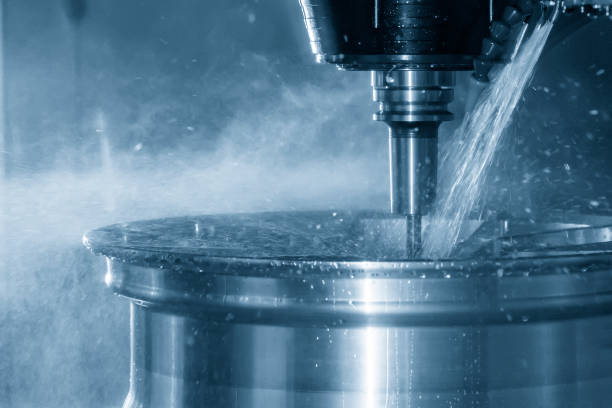Introduction
CNC machining has revolutionized the manufacturing industry, allowing for precise and efficient production of various components. Aluminum, known for its lightweight, durability, and excellent thermal and electrical conductivity, is a popular material choice for many applications. This article will delve into the world of CNC machining aluminum parts, exploring the precision engineering techniques that enable superior performance.
The Advantages of Aluminum for CNC Machining
Aluminum offers several advantages that make it an ideal material for CNC machining. Firstly, its lightweight nature reduces the overall weight of the final product, making it suitable for applications where weight is a critical factor, such as aerospace and automotive industries. Additionally, aluminum has excellent corrosion resistance, ensuring the longevity and durability of the machined parts.
Furthermore, aluminum possesses exceptional thermal conductivity, allowing for efficient heat dissipation. This characteristic makes it an optimal choice for heat sinks and other applications that require effective thermal management. Additionally, aluminum’s high electrical conductivity makes it well-suited for electrical components and wiring systems.
Precision Engineering Techniques
Achieving the desired precision and accuracy in CNC machining aluminum parts requires the application of various advanced techniques. Let\’s explore some of these techniques:
1. Computer-Aided Design (CAD): The first step in CNC machining aluminum parts is designing the part using CAD software. This software allows engineers to create a 3D model of the desired component, specifying its dimensions and tolerances.
2. Computer-Aided Manufacturing (CAM): Once the design is complete, CAM software converts the CAD model into machine-readable instructions. CAM software optimizes tool paths and generates G-code, which guides the CNC machine during the machining process.
3. High-Speed Machining: High-speed machining (HSM) is a technique that involves using high spindle speeds and feed rates to remove material rapidly. This technique ensures faster production while maintaining precision and surface finish.
4. Multi-Axis Machining: Multi-axis machining allows for more complex and intricate designs to be produced. By moving the workpiece along multiple axes simultaneously, CNC machines can create geometrically complex aluminum parts with high precision.
5. Tooling and Cutter Selection: The selection of appropriate tooling and cutters is crucial for achieving precision in CNC machining aluminum parts. Factors such as the material, geometry of the part, and desired surface finish determine the choice of tools. Carbide cutters are commonly used for aluminum machining due to their high wear resistance.
Applications of CNC Machined Aluminum Parts
CNC machined aluminum parts find applications in various industries, owing to their exceptional properties and precision engineering. Some notable applications include:
1. Aerospace Industry: Aluminum components are extensively used in aircraft manufacturing due to their lightweight nature and high strength-to-weight ratio. CNC machined aluminum parts are crucial for aircraft structures, engine components, and interior fittings.
2. Automotive Industry: Aluminum parts play a vital role in automotive manufacturing, contributing to weight reduction and improved fuel efficiency. CNC machined aluminum parts are commonly used in engine blocks, transmission components, and suspension systems.
3. Electronics Industry: The excellent thermal and electrical conductivity of aluminum make it an ideal material for electronic components. Heat sinks, connectors, and enclosures are often CNC machined from aluminum to ensure efficient heat dissipation and reliable electrical connections.
4. Medical Industry: CNC machined aluminum parts find applications in the medical sector, where lightweight, corrosion-resistant, and sterilizable materials are required. Prosthetics, surgical instruments, and imaging equipment often incorporate aluminum components.
Abschluss
CNC machining aluminum parts require precision engineering techniques to achieve superior performance. The advantages of aluminum, such as its lightweight, durability, and thermal and electrical conductivity, make it a popular material choice. Advanced techniques like CAD/CAM, high-speed machining, and multi-axis machining ensure the precise production of aluminum components. The applications of CNC machined aluminum parts span across industries, including aerospace, automotive, electronics, and medical sectors, where their properties and precision engineering contribute to superior performance.
-

- UAV-Teile aus Thixomolding-Druckguss aus Magnesiumlegierung C
-

- CNC-bearbeitete Teile Lenkungshalterung
-

- Starrgabel aus Magnesiumlegierung für Fahrräder - kundenspezifische Druckguss-Metallteile
-

- Laptopgehäuseabdeckung C
-

- Thixomolding-Druckguss-UAV-Teile aus Magnesiumlegierung
-

- OEM-Druckgusshersteller produzieren Magnesiumlegierungsräder für Kinderlaufräder

 0086-750-5616188
0086-750-5616188 +86 13392089688
+86 13392089688 sales@zhongmei-tech.com
sales@zhongmei-tech.com








